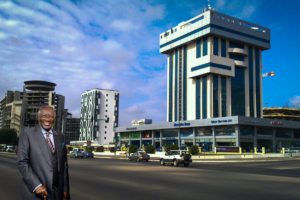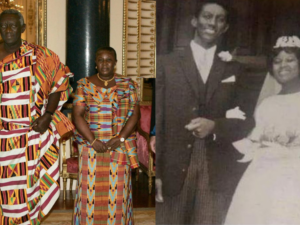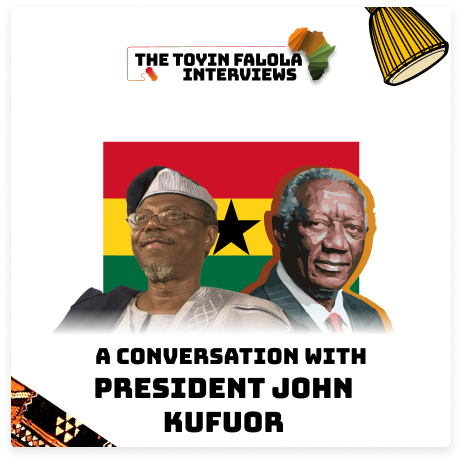By
Toyin Falola
(***This is a report of the two-hour interview with President John Kufuor. For a complete recording of the interview, visit: https://youtu.be/XSRghCf0IAQ)
Born John Agyekum Kufuor in Kumasi in 1938, His Excellency John Kufuor is the second-ever democratically elected President of Ghana. Elected in the Fourth Republic, he served between 7 January 2001 and 7 January 2009. Before President Kufuor’s election to office, Ghana— formerly comprising many independent nations, with trade relations as far as Europe—from 1966, was bedeviled by a series of military coups and successive regimes which lasted until 1992, when former dictator John Jerry Rawlings introduced a multi-party system and himself transitioned into a civilian President.
To his admirers at home and abroad, President Kufuor’s remarkable achievements in office have earned him a position of respect in the ranks of Africa’s former leaders. At home, he is known to have led Ghana away from economic stagnation and decline into economic stability leading to an unprecedented growth pace. In Africa and its diaspora, President Kufuor distinguished himself as an outstanding statesman, democrat and international figure, serving severally in intermediary capacities between African states and lending voice to call for an equitable international social and economic order. For this and many other exemplary feats, John Agyekum was invited as a distinguished guest to the Toyin Falola Interviews to share his wealth of experience, lessons, and recommendations for Africa and the future generation.
 Kufuor on a street in Ghana
Kufuor on a street in Ghana
With a group made up of hosts, anchors, and the audience gathered, the interview session commenced with introductions by the interview originator, myself, and co-host Obinna Akahara, who welcomed everyone and introduced the guest questioners. Without much ado, the interview commenced with his excellency answering questions from Prof. David Owusu-Ansah, Dr. Nana Ayindoho, and subsequently a youth representative contingent and the general audience.
Reacting to a question from Prof. David Owusu-Ansah on the recommendation of five-year tenures for African presidents, his excellency responded in the affirmative. Using his own personal experience—as a newly elected official setting up a government with people who mostly were yet to cut their teeth politically—for an illustration, President Kufuor cited appointments and other bureaucratic challenges, especially in the amount of time it takes to settle-in with cabinet members, and ministers with their portfolios ready for the business of governance—policy formulation and implementation. This, he alludes to most of the activities in the first year, leaving the administration with only about three years to make its mark, which is hardly enough time to make a dent in politics.
Regarding the tendency for political leaders—such as in Ivory Coast—to use such provisions (five-year tenures) as opportunities to entrench themselves in power perpetually through constitutional tinkering, his excellency attributed this to a lapse in the individual characters of African leaders. This, unfortunately, has posed one of the biggest challenges to governance performance and the adoption of democratic systems, which President Kufuor believes is the key to delivering the dividends of good governance in Africa. Unfortunately, the tradition in most African countries after independence has been for political leaders—who have successfully led the nationalist struggle for freedom—to set themselves up as lifetime presidents to be succeeded either by their spouses or their children.
Commenting on his achievements as president of Ghana, his excellency drew attention to the deplorable conditions in which he found its economy and health sector. While the former was burdened heavily by debt (both domestic and foreign), the latter was infamously known as operating a “cash and carry” system where individuals without means were subjected to tragic fates. Through an introduction of socio-economic policies captured in a “Five Priority Areas Program” fashioned to accentuate the wealth-creating potentials of and cushion the effects of debilitating poverty on the Ghanaian populace, President Kufuor insisted that he pursued a policy of good governance, intensive infrastructural development, improved social services and the modernization of agriculture for rural development.
 Kufour on his wedding day
Kufour on his wedding day
His efforts, as far as he is concerned, yielded results in the form of the sustenance of cocoa production as the mainstay of the economy, even in the face of oil production. In the health sector, his National Health Insurance Scheme provided health services for eleven million Ghanaians. He also introduced enabling reforms in the education and finance sectors that saw more Ghanaians utilizing their opportunities. Even after his time as president, he has continued to impact Ghanaians’ lives through his foundation, the John Agyekum Kufuor (JAK) Foundation, dedicated to finding and grooming the next generation of Ghanaians in the areas of leadership, governance, and development.
Fielding questions from Dr. Nana Anyidoho on his administration’s contribution to women’s economic empowerment and participation in state processes and the growing Chinese financial presence in Africa. His excellency drew attention to women’s appointment into positions of responsibility in his government and the provision of business credit and health facilities to cater to their economic and physical well-being. On the matter of increased Chinese capital circulation in Africa, he points out that no region can develop in isolation, emphasizing the need for African governments to adopt an attitude (diplomacy) of negotiation. This is because Africa is a resource-rich area that cannot yet develop them. Therefore, it needs capital investments and industrial partnerships to harness and develop these resources, which can only be achieved through negotiations. However, these negotiations must be conducted in a way that does not keep Africa dependent on China. And one way to ensure this does not happen is to ensure judicious use of funds or other assistance offered in the development of African infrastructure and capacity.
Taking questions from the youth wing on what moments of his career gave him great pride and fulfillment, and the moments of regrets if he thought he had enough time during his tenure, and his advice for the youth. President Kufuor recalled his journey of service in Ghanaian politics, which he joined from the young age of thirty years as a member of parliament in 1969, and his subsequent eventful rise to the office of President of Ghana. To President John Kufuor, this was his most significant moment to be trusted by millions of his countrymen to manage their affairs effectively. Regarding pitfalls, his excellency briefly describes some unsavory experiences during the military era and election defeats during the democratic dispensation. His position on whether he achieved enough with the time specified by the constitution was that he did the best he could with what he had to work with, citing human fallibility. However, since he believed that more time might improve leaders’ performance, this was based on the low culture of continuity in governance between democratic political dispensation.
President Kufuor admonished the youths not to shy away and contemplate African problems from other societies’ comfort, where they enjoy social benefits lacking at home. He encouraged them to apply whatever skill and experience they have gathered to seek solutions to Africa’s transformation challenges. He reiterated his belief in democracy to ensure inclusive governance, guarantee the regard for human rights, and ensure development continuity, especially where the right leaders are selected. Democracy, he explains, might assume some Western orientations and conceptualization. Still, its fundamental principle of broad consultation in decision making has long been part of the African indigenous social decision-making process. Hence, democracy should not be perceived as being foreign/alien and unrepresentative of African realities given its imperfections. It holds enormous development opportunities, given its practices are fine-tuned over time with practice. Therefore, he asked that the youths remain committed to the African project and contribute by taking an active part in politics and other state decision making avenues.
For a legacy, his excellency notes the strides he made in the education sector, which he believes would provide the springboard for Africa’s development by improving its human capital quality. Noting that ignorance and poor leadership have always been a bane to social cohesion and economic development in Africa, an educated population would not be saddled by such encumbrances. Thus, it can focus its efforts on the nation-building and development project. This may have informed the decision to set up his foundation, which is focused on grooming young Ghanaians in leadership, governance, and development experience.
The Toyin Falola Interviews will invite him back at a future date, as we still have more questions to pose.
Interview Link: https://toyinfalolanetwork.org/the-toyin-falola-interviews-a-conversation-with-president-john-kufuor/


